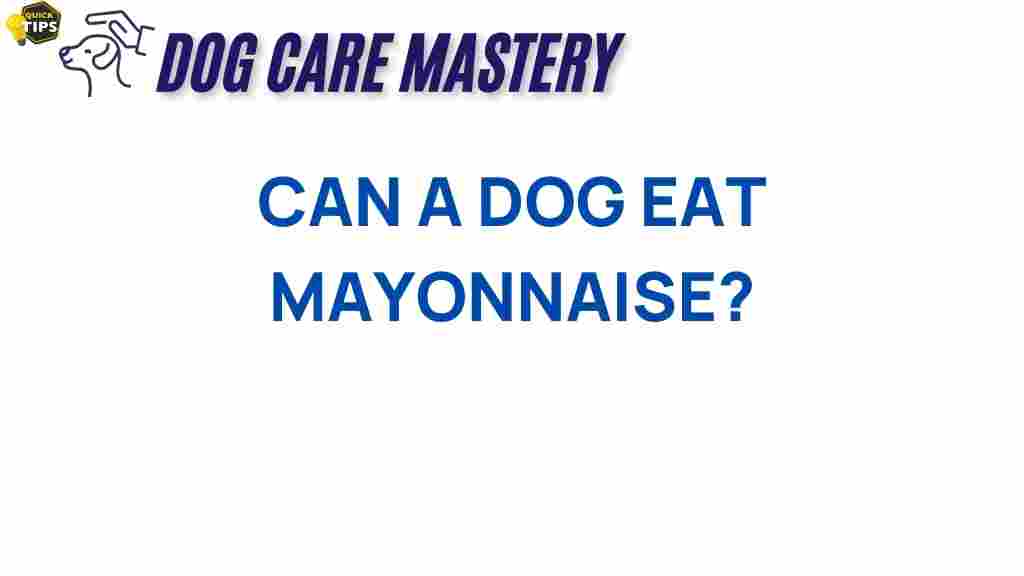Can a Dog Eat Mayonnaise? Understanding Dog Health
As a pet owner, you often find yourself questioning what foods are safe for your furry friend. One common condiment that raises eyebrows is mayonnaise. Can a dog eat mayonnaise? This question is pertinent to many dog owners concerned about their pet’s diet and overall dog health. In this article, we will unpack the myths and facts about mayonnaise and its effects on dogs, helping you make informed decisions about your pet’s nutrition.
Understanding Mayonnaise
Mayonnaise is a popular condiment made primarily from eggs, oil, and vinegar or lemon juice. While it adds creaminess and flavor to sandwiches and salads, its nutritional profile raises questions regarding its suitability for dogs. Here’s a closer look at its ingredients:
- Eggs: A source of protein and essential fatty acids.
- Oil: High in fat, often derived from soybeans, canola, or olive oil.
- Vinegar or Lemon Juice: Adds acidity and flavor but can be harsh on a dog’s stomach in large amounts.
Can Dogs Eat Mayonnaise? The Facts
The simple answer is: yes, dogs can eat mayonnaise in moderation. However, it’s essential to consider the following factors related to dog health:
1. Moderation is Key
Mayonnaise is high in calories and fat. While a small amount won’t harm your dog, excessive consumption can lead to obesity and related health issues. If you decide to share some mayonnaise with your dog, keep the following points in mind:
- Limit the amount to a teaspoon or less, depending on your dog’s size.
- Avoid flavored mayonnaises, as they may contain ingredients toxic to dogs, such as garlic or onion.
2. Allergies and Sensitivities
Just like humans, dogs can have food allergies or sensitivities. Monitoring your dog for any adverse reactions after consuming mayonnaise is crucial. Symptoms to watch for include:
- Vomiting
- Diarrhea
- Itching or skin irritations
3. Nutritional Value
While mayonnaise contains some beneficial nutrients, it lacks essential vitamins and minerals that dogs need. Rather than using mayonnaise as a regular part of your dog’s diet, consider healthier alternatives. For enhancing your dog’s meals, you can try:
- Plain yogurt: A good source of probiotics.
- Peanut butter: A tasty treat (ensure it’s xylitol-free).
- Pumpkin puree: A fiber-rich addition that aids digestion.
Health Risks of Mayonnaise for Dogs
While mayonnaise is not toxic to dogs, there are certain health risks associated with its consumption:
1. High Fat Content
The high fat content in mayonnaise can lead to pancreatitis in dogs, a serious condition that results from inflammation of the pancreas. Symptoms include:
- Abdominal pain
- Lethargy
- Loss of appetite
2. Weight Gain
Regular consumption of high-calorie foods like mayonnaise can contribute to weight gain, increasing the risk of obesity and related health problems such as:
- Joint issues
- Diabetes
- Heart disease
3. Digestive Issues
Some dogs may experience digestive upset after consuming mayonnaise. If your dog has a sensitive stomach, it’s best to avoid this condiment altogether.
What to Do If Your Dog Eats Mayonnaise
If your dog has consumed mayonnaise, here’s a step-by-step guide to follow:
- Assess the Situation: Determine how much mayonnaise your dog ate and their size.
- Monitor for Symptoms: Keep an eye out for vomiting, diarrhea, or any changes in behavior.
- Contact Your Veterinarian: If your dog shows any adverse symptoms or if they consumed a large amount, consult your vet for advice.
Alternatives to Mayonnaise for Dogs
If you’re looking for ways to add flavor or moisture to your dog’s food, consider these healthier alternatives:
- Homemade Dog Treats: Use dog-safe ingredients to create tasty snacks.
- Bone Broth: A nutritious and flavorful addition to dry kibble.
- Vegetable Purees: Cooked carrots or sweet potatoes can be a healthy addition.
Conclusion
In conclusion, while dogs can eat mayonnaise in moderation, it’s not the healthiest option for their diet. Prioritizing dog health involves choosing foods that provide essential nutrients without the risks associated with high-fat condiments. Always monitor your dog for any adverse reactions and consult your veterinarian if you have concerns about their diet.
For more information on maintaining your dog’s health, check out this comprehensive guide on dog nutrition. Remember, a well-balanced diet leads to a happy and healthy pet!
Lastly, if you’re looking for alternatives to mayonnaise, consider exploring this resource for healthy dog treat recipes that will keep your furry friend satisfied and healthy!
This article is in the category Nutrition and created by dogcaremastery Team
